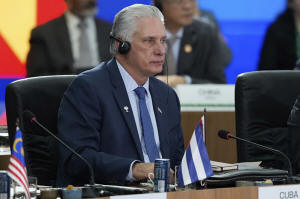|
U.S. Secretary of State Marco Rubio said on social media
platform X that the State Department also would impose visa
restrictions on Cuban judicial and prison officials “responsible
for, or complicit in, the unjust detention and torture of the
July 2021 protesters.”
The protests, which were not led by an opposition group,
developed July 11 and 12, 2021, drawing attention to the depths
of Cuba’s economic crisis.
“The U.S. will continue to stand for the human rights and
fundamental freedoms of the people of Cuba, and make clear no
illegitimate, dictatorial regimes are welcome in our
hemisphere,” Rubio said in the statement.
The Trump administration has taken a harder line against Cuba's
government than the Biden administration.
In addition to Díaz-Canel, the U.S. sanctioned Cuban Defense
Minister Álvaro López Miera and Interior Minister Lázaro Álvarez
Casas.
Shortly after the announcement, Johana Tablada, deputy director
of the U.S. department in the Cuban Foreign Ministry, lashed out
at Rubio, calling him a “defender of genocide, prisons and mass
deportations.”
The rare protests in 2021 came about after repeated blackouts in
Havana and other cities. One man died and some marches ended in
vandalism.
Groups supporting the government responded along with
authorities to repress the protests. Human rights groups
estimated there were more than 1,000 arrests but the government
gave no official figures.
At the time, the Cuban government said it was the result of a
U.S. media campaign and decades of U.S. sanctions.
In 2022, Cuban prosecutors said some 790 people were
investigated for acts related to the protests ranging from
disorder to sabotage and vandalism.
The advocacy group 11J, whose name alludes to the protests, said
late last year there were 554 people serving sentences related
to the protests, but some were given conditional release in
January after an appeal from Pope Francis.
All contents © copyright 2025 Associated Press. All rights
reserved |
|




